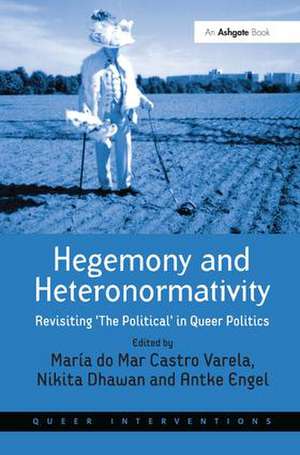Hegemony and Heteronormativity: Revisiting 'The Political' in Queer Politics
Editat de María do Mar Castro Varela, Nikita Dhawan, Antke Engelen Limba Engleză Hardback – 28 apr 2011
Preț: 822.01 lei
Preț vechi: 1104.00 lei
-26% Nou
Puncte Express: 1233
Preț estimativ în valută:
157.29€ • 164.22$ • 130.18£
157.29€ • 164.22$ • 130.18£
Carte tipărită la comandă
Livrare economică 04-18 aprilie
Preluare comenzi: 021 569.72.76
Specificații
ISBN-13: 9781409403203
ISBN-10: 1409403203
Pagini: 224
Dimensiuni: 156 x 234 x 19 mm
Greutate: 0.57 kg
Ediția:1
Editura: Taylor & Francis
Colecția Routledge
Locul publicării:Oxford, United Kingdom
ISBN-10: 1409403203
Pagini: 224
Dimensiuni: 156 x 234 x 19 mm
Greutate: 0.57 kg
Ediția:1
Editura: Taylor & Francis
Colecția Routledge
Locul publicării:Oxford, United Kingdom
Notă biografică
MarÃa do Mar Castro Varela is Professor for Gender and Queer Studies at the Alice Salomon University Berlin, Germany Nikita Dhawan is Junior Professor of Gender and Postcolonial Studies at Goethe-University Frankfurt, Germany Antke Engel is Director of the Institute for Queer Theory, Berlin, and research fellow at the Institute for Cultural Inquiry, Berlin, Germany
Recenzii
'This is an extraordinary collection that explores the relationship between queer theory and hegemony, charting a new direction for political thought. Here two important critical theories are brought into vital contact with one another. Hegemony establishes our consenting activities as effects of the very norms we seek to contest. Heteronormativity describes the constitutive paradox of being enabled by the very norms that constrain and produce us as intelligible subjects.  This also affects the concept of heteronormativity. By thinking about heteronormativity in light of the theory of hegemony, we see an opportunity to recast queer theory at a critical distance from the neo-liberal celebration and normalization of difference. How do unmarked norms constrain the field of differences? What we find in these pages is the notion that the counter-hegemonic must give political form to tensions that resolve neither into the normalization of difference nor the assertion of simple identity. By introducing incommensurability into our equations, what cannot be resolved becomes the condition of any future alliance. Considering critically the tension between consent and coercion, between queer theory and neo-liberalism, this volume shows how norms are incorporated and contested at the level of bodily practices and how power thrives in non-codifiable cultural conventions. In helping us to rethink power, new modes of embodied existence and future alliance, this book proves smart and urgent for our times.' Judith Butler, University of California, Berkeley, USA ’Overall, this is a diverse collection in ethos, tone and content which draws on international perspectives and material.’ Somatechnics
Cuprins
Chapter 1 Introduction, Maraa do Mar Castro Varela, Nikita Dhawan, Antke Engel; Chapter 1a Revisiting Contingency, Hegemony and Universality, Randi Gressgard; Chapter 2 From the 'Heterosexual Matrix' to a 'Heteronormative Hegemony': Initiating a Dialogue between Judith Butler and Antonio Gramsci about Queer Theory and Politics, Gundula Ludwig; Chapter 3, Antke Engel; Chapter 4 Normative Dilemmas and the Hegemony of Counter-Hegemony, María do Mar Castro Varela, Nikita Dhawan; Chapter 5 How Sam Became a Father, Became a Citizen: Scripts of Neoliberal Inclusion of Disability, Katerina kolarova; Chapter 6 Signifying Theory_Politics/Queer?, Susanne Lummerding; Chapter 7 The Pleasures of Compliance: Domination and Compromise Within BDSM Practice, Volker Woltersdorff;
Descriere
This book reflects on 'the political' in queer theory and politics by revisiting two of its key categories: hegemony and heteronormativity. It explores the specific insights offered by these categories and the ways in which they augment the analysis of power and domination from a queer perspective, whilst also examining the possibilities for political analysis and strategy building provided by theories of hegemony and heteronormativity. By looking at the interplay between these two categories, this groundbreaking volume presents new possibilities of reconceptualizing 'the political' from a queer perspective.















